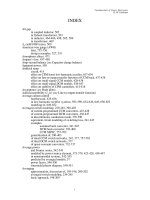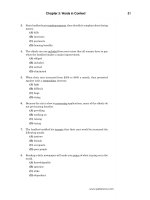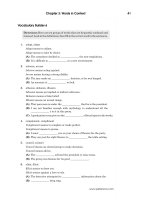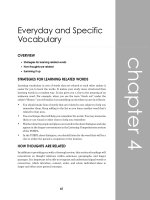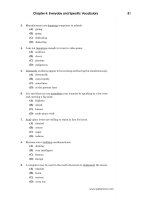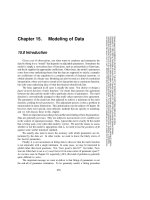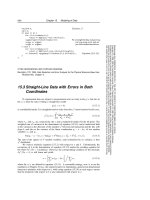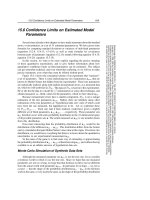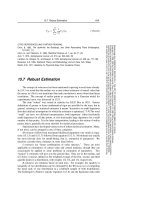Tài liệu Master of International & Developmental economics pptx
Bạn đang xem bản rút gọn của tài liệu. Xem và tải ngay bản đầy đủ của tài liệu tại đây (1.04 MB, 24 trang )
ANU COLLEGE OF ASIA & THE PACIFIC
MASTER OF International &
Developmental Economics
CRAWFORD
SCHOOL
CRAWFORD SCHOOL
1 The Australian National University
1 The Crawford School
2 Study options
3 Introductory Academic Program
3 Student Testimony
4 Master of International and Development
Economics
4 Graduate Diploma in International and
Development Economics
7 Graduate Certificate in International and
Development Economics
9 Combined Degree in Diplomacy
9 Crawford School faculty
12 Fees
13 Scholarships
13 Entry requirements
14 Language requirements
14 How do I apply?
15 Teaching and timetables
16 Canberra, the capital of Australia
16 ANU facilities and services
17 Course descriptions
Contact details - see back cover
Master of
INTERNATIONAL
& DEVELOPMENTAL
Economics
CRAWFORD
SCHOOL OF ECONOMICS & GOVERNMENT
CONTENTS
Master of International & Developmental Economics
1
The AUSTRALI AN
National University
The Australian National University consistently ranks as one of the best universities
in Australia and the world. The ANU has been ranked 1
st
in Australia and 16
th
in the
world by the Times Higher Education Supplement (October 2008).
The ANU through the Master of International and Development Economics offers:
a recognised degree from a leading Australian and world university.•
the option of five specialisations, with a broad list of elective units, giving you extensive freedom of choice •
to suit your career aspirations.
excellent lecturers with extensive research, industry and public sector experience both in Australia •
and internationally.
flexible teaching timetables to help fit in with work and home demands.•
excellent networking opportunities to mix with public sector and industry professionals from •
throughout Australia and the Asia Pacific region.
CRAWFOR D School
The Crawford School is the Australian National University’s policy school,
serving Australia, Asia and the Pacific through advanced policy research and
professional training. Our reputation rests on first-class research capacities and
highly successful graduate training programs. Our graduate training and research
frames scholarly and policy debates in Australia and the Asia Pacific region, and
Australia’s relationships with the region.
We focus on public policy, administration, natural resource economics, environmental management and
development and international development economics. Our master degrees provide pathways into higher
research that informs, stimulates and adds to the vibrancy and intellect within our School.
Other Master degrees offered by the school include Master of Public Policy, Master of Public Administration,
Master of Environmental and Resource Management and Master of Environmental and Resource Economics.
Visit www.crawford.anu.edu.au for further information.
CRAWFORD SCHOOL
2
STU DY OPT IONS
Master of International
and Development E conomics
The Master degree is designed for prospective students with a strong background in
economics, mathematics and statistics, who are eager to apply their skills to economic
policy issues and practical problems in applied economics.
8 courses
1 year full time or up to 5 years part-time (maximum)
Intake in semester 1 and 2
Graduate Diploma in International
and Development E conomics
The Graduate Diploma is designed to provide a solid training in basic economic
principles and techniques. There is a strong analytical and quantitative component
and you should be capable of undertaking studies in mathematics and statistics at a
fairly advanced level.
Students who successfully graduate from the Graduate Diploma in International and
Development Economics with an overall average of 65 per cent and meet the entry
requirements for the MIDEC may progress into this degree. Program Director approval
is required.
6 courses
1 year full-time or up to 5 years part-time (maximum)
Intake in semester 1 and 2
Graduate Certificate in International
and Development E conomics
There is a strong analytical and quantitative component of the Graduate Certificate
and you should be capable of undertaking studies in mathematics and statistics at
a fairly advanced level. The Graduate Certificate requires satisfactory completion of
these courses over one semester full-time or equivalent part-time.
Bridging Course
Six months full-time for students who do not meet direct entry requirements for the
Master or Graduate Diploma. Contact the Program Administrator for details.
Master of International & Developmental Economics
3
Introductory
ACADE MIC Program
If your application is successful, international students (non-Australian citizens) are
required to attend and satisfactorily complete the Introductory Academic Program.
This is held prior to the beginning of each semester in January and June. Topics
covered include orientation to the academic system, academic writing and
presentation work, referencing and research techniques, economics, mathematics,
statistics and the use of computers and the University’s libraries and electronic
information sources.
Domestic Australian students (Australian citizens) are encouraged to attend a short induction program, conducted
just prior to the start of each semester. This program offers an informal social gathering of Crawford School
academics and staff together with new students, at which information about the teaching programs and academic
research is presented.
Student TESTIMONY
I have enjoyed my study at Crawford over the last year. The IDEC program
was excellent, in my view, because it offered applied economics that
bridges the gap between the understanding of economic theory and
how it can be used for policy oriented solutions. This approach was
exactly what I was looking for and I believe prepared me well in my
recent application for a PhD.
In my former life I studied as an Engineer and worked with Qantas for
a number of years, but I had always wanted to study economics. I enrolled in
the Sydney University Masters in Economics program, of which I completed
6 months, and then I applied to the IDEC program. I resigned from Qantas
and moved from Sydney to Canberra specifically to undertake the IDEC
program because after many hours of research I found it to be the best for
Development Economics. I was not disappointed.
…to anyone that I have talked with who is interested in further applied
study, particularly on Development, I have recommended the IDEC program.
Matthew McKay
IDEC Program 2008
CRAWFORD SCHOOL
4
Master of
INTERNATI ONAL
& D EVELOP MENTAL
Economics
The Master of International and Development Economics provides students with
world-class training in applied economics and its application to economic policy. In
addition to courses in applied economic theory and econometrics, students are able
to choose electives to specialise in one or more of the following five streams.
(1) International Trade, Growth and Finance
(2) Banking, Monetary Policy and Economic Development
(3) Environmental Economics, Natural Resource Policy and
Development
(4) Quantitative Methods
(5) Business Development and Economic Policy in a Market Economy.
Core Courses
Masters Microeconomics
Open Economy Macroeconomics, Banking and Finance
Government, Markets and Global Change
Elective Courses
In addition to the three core courses, you are required to undertake five approved Electives
(Master level) from the IDEC Program, from the ANU College of Business and Economics,
or from approved courses within the Crawford School.
Advanced Econometric Methods Japanese Economy & Economic Policy
Agricultural Economics & Resource Policy
Applied Economic Dynamics Law & Economics
Applied Economics: Cost Benefit Analysis
Applied Macro & Financial Econometrics
Applied Micro-Econometrics Mathematical Economics
Applied Welfare Economics Mathematical Techniques in Economics II
Australian Water Conflicts
Business and Economic Forecasting Methods for Environmental Decision Making
Case Studies in Economic Policy
Baojuan Wang – MIDEC (PR China)
Master of International & Developmental Economics
5
(continued from previous page)
China and the World
Climate Change Policy Economics
Comparative Economic Policy of APEC Countries
Contemporary Economic Theories for Policy
Corruption and Anti-corruption Political Economy of Economic Reform
Economic Development Poverty Reduction
Economic Globalisation and the Environment
Economic Growth Political Economy of Macroeconomic Policy
Energy Politics and Governance
Environmental Economics Public Economics
Federalism and Decentralisation
Financial Economics
Health Economics
International Economics
International Trade Theory
International Water Politics
Labour Economics & Industrial Relations
Managing Government Finances
Masters Research Essay
Monetary Policy & Central Banking in the Asia Pacific
Personnel Economics for Management
Principles of Public Economics
Quantitative International Economics
Southeast Asian Economic Policy & Development
Strategic Thinking: An Introduction to Game Theory
The Chinese Economy
The Economics of Incentives & Institutions
The Global Trading System
The Role of Financial Markets & Instruments for Economic Management & Development
Trade, Development & the Asia Pacific Economy
Please refer to Course Descriptions for details or visit www.crawford.anu.edu.au/prospectivestudents
Nur Rakhman Setyoko –
MIDEC (Indonesia)
CRAWFORD SCHOOL
6
Graduate Diploma in
INTERNATI ONAL
& D EVELOP MENTAL
EC ONOMIC S
The Graduate Diploma is designed to provide students with a solid training in basic
economic principles and techniques. The degree also serves as a springboard to more
advanced training at the Master level. There is a strong analytical and quantitative
component, and students should be capable of undertaking studies in mathematics
and statistics at a fairly advanced level.
Core Courses
You are required to undertake five core courses as listed below.
Econometric Techniques
Issues in Development Policy
Macroeconomic Analysis & Policy
Mathematical Methods in Applied Economics
Microeconomic Analysis & Policy
Elective Courses
In addition to the core courses, you are required to select one approved elective listed below.
Applied Economics: Cost/Benefit Analysis or
Personnel Economics for Management or other elective, approved by the Program Director.
Graduating International Development Economics students, December 2008
Master of International & Developmental Economics
7
Graduate Certificate in
INTERNATI ONAL
& DEVELOP MENTAL
EC ONOMIC S
The Graduate Certificate allows students who are unable to complete the Graduate
Diploma or Masters Degree in International and Development Economics to receive
certification by completing three courses over one year, or intensively during one
semester. There is a strong analytical and quantitative component and you should
be capable of undertaking studies in mathematics and statistics at a fairly advanced
level. Bridging courses in mathematics, economics and statistics are available.
You can choose three courses from the list below, or two courses from the list below and one other approved elective.
Applied Economics: Cost/Benefit Analysis Mathematical Methods in Applied Economics
Econometric Techniques Microeconomic Analysis & Policy
Issues in Development Policy Personnel Economics for Management
Macroeconomic Analysis & Policy
Refer to Course Descriptions or visit www.crawford.anu.edu.au/prospectivestudents
Dr Sizhong Sun, Dr Renata Hasanova, Dr Ana Sartbaeva, Elmira Mudarisova (Uzbekistan), Professor Tom Kompas (IDEC
Director) and Asel Abdyldaeva (Kyrgyzstan). Students and staff from the International Development Economics program.
CRAWFORD SCHOOL
8
Specialisations
Students who are undertaking a Master of International and Development Economics can
choose to specialise in one of the following five fields. A possible combination of courses is listed.
International Trade, Growth and Finance
IDEC8064 Masters Microeconomics
IDEC8010 Quantitative International Economics
IDEC8008 Open Economy Macroeconomics, Finance and Development
ECON8006 International Trade Theory
IDEC8083 Financial Markets and Instruments
ECON8037 Financial Economics
IDEC8009 Trade, Development and the Asia Pacific Economy
IDEC8012 Monetary Policy and Central Banking
Banking, Monetary Policy and Economic Development
IDEC8064 Masters Microeconomics
IDEC8010 Quantitative International Economics
IDEC8008 Open Economy Macroeconomics, Finance and Development
IDEC8083 Financial Markets and Instruments
ECON8037 Financial Economics
IDEC8012 Monetary Policy and Central Banking
EMET8010 Applied Macro and Financial Econometrics
ECON8071 Modelling the Open Economy
Environmental Economics, Natural Resource Policy and Development
IDEC8064 Masters Microeconomics
IDEC8010 Quantitative International Economics
IDEC8008 Open Economy Macroeconomics, Finance and Development
IDEC8018 Agricultural Economic and Resource Policy
IDEC8053 Environmental Economics
IDEC8004 Sustainability and Ecological Economics
EMDV8002 Methods for Environmental Decision Making
Quantitative Methods and Economic Modelling
IDEC8064 Masters Microeconomics
IDEC8010 Quantitative International Economics
IDEC8008 Open Economy Macroeconomics, Finance and Development
IDEC8020 Applied Economic Dynamics
ECON8053 Strategic Thinking
ECON8059 Mathematical Economics
EMET8014 Advanced Econometric Models
EMET8010 Applied Macro and Financial Econometrics
Business Development and Economic Policy in a Market Economy
IDEC8064 Masters Microeconomics
IDEC8010 Quantitative International Economics
IDEC8008 Open Economy Macroeconomics, Finance and Development
IDEC8019 Political Economy and Economic Reform
IDEC8012 Monetary Policy and Central Banking
CRWF8000 Government, Markets and Global Change
IDEC8018 The Economics of Incentives and Institutions
ECON8049 South East Asia Economic Policy and Development
Master of International & Developmental Economics
9
Crawford S chool
FA CULTY
Our lecturers are highly influential and respected in their fields for their research and
teaching excellence. You will benefit from their extensive knowledge, experience and
ongoing participation in public policy debate both in Australia and within the Asia
Pacific region.
As a student at Crawford, you will have access to a large pool
of academics and support staff, and you can take advantage of
Crawford-wide courses, and electives from other degree programs to
enrich your learning experience.
Visit www.crawford.anu.edu.au/staff for information on staff and listings
of their publications.
Faculty teaching in this program include
Professor Tom Kompas
Professor Tom Kompas is Director of the International and Development
Economics Program and Senior Research Economist Consultant at the
Australian Bureau of Agricultural and Resource Economics (ABARE).
He specialises in economic growth and dynamics, the economics
of fisheries, agricultural and resource economics and productivity.
His current projects include research work on the economics of
quarantine, social capital and growth, market reform and rice
production in Vietnam and fisheries management. Professor Kompas
received the 2004 Crawford Award for Research Excellence from
ABARE and is co-editor of the Australian Journal of Agricultural and
Resource Economics.
Website: www.crawford.anu.edu.au/staff/tkompas.php
Combined DEG REE in
DI PLO MAC Y
Master of Diplomacy/Master of International & Development Economics
This Master level degree requires the completion, at distinction average, of the Master of International and
Development Economics before progressing onto a further six months full-time study taking diplomacy related
courses. In total it takes 18 months full-time to complete.
Professor Tom Kompas,
Director of the IDEC program
CRAWFORD SCHOOL
10
Professor Trevor Breusch
Professor Breusch is an econometrician who has been
at the forefront of Australian econometrics for the
past two decades. His research interests are varied
and include econometric methods and computational
tools in econometrics labour market participation
and earnings, data archives and replication studies.
Professor Breusch is a Fellow of the Econometric
Society, Chair of the Standing Committee of
Australasian Region Econometric Society, Member
of the Methodology Advisory Committee of the
Australian Bureau of Statistics and member of the
ANU Human Research Ethics Committee.
Website: www.crawford.anu.edu.au/staff/tbreusch.php
Adjunct Professor Patrick de Fontenay
Dr de Fontenay is the former Director of the
International Monetary Fund Institute, a distinguished
economist and has served in various senior posts
around the world. His research and expertise includes
macroeconomics/international economics, financial
markets and instruments, and training. Currently he is
studying the impact of financial services liberalisation
on asset management, and the development of
derivatives markets in emerging economies.
Website: www.crawford.anu.edu.au/staff/
pdefontenay.php
Professor Prasanna Gai
Professor Gai joined the Crawford School from
the Bank of England. He is an expert in financial
economics and macro-economic policy. His previous
work has included the development of an operational
model for quantitative and systemic risk analysis. His
current research interests include financial innovation,
macroeconomic stability and systemic risk.
Website: www.crawford.anu.edu.au/staff/pgai.php
Professor R. Quentin Grafton
Professor Grafton is the convener of the Master and
Graduate Diploma of Environmental and Resource
Economics. He has 20 plus years experience in
the fields of agriculture, the environment, natural
resources and economics. He has been listed in the
top 500 of the world’s economists and has been
included in Who’s Who in the World, Dictionary of
International Biography, and Who’s Who in Science
and Engineering. He is the author or editor of eight
books and 60 plus journal articles and is the recipient
of numerous and prestigious research awards and
prizes. Professor Grafton has advised extensively on
the issues of environmental, natural resources and
agricultural economics to organisations such as the
OECD, Australian, North American and New Zealand
governments. He is co-editor of the Australian Journal
of Agricultural and Resource Economics.
Website: www.crawford.anu.edu.au/staff/qgrafton.php
Professor Kaliappa Kalirajan
Professor Kalirajan is an applied economist and
policy analyst. His areas of major interests include
macroeconomic and trade policies and reform,
poverty reduction, and sources of growth. His work
on the stochastic frontier production function
methodology has given him international recognition.
He has several research publications in these areas in
reputed academic and policy-oriented journals. He has
taught and supervised students for PhD in Economics
in the following universities: Madurai University, India;
National University of Singapore; University of the
Philippines; The Australian National University; Sophia
University, Japan; International University of Japan;
International Christian University, Japan, and National
Graduate Institute for Policy Studies, Japan. He is also a
visiting professor at the Madras School of Economics,
Chennai, India.
Website: www.crawford.anu.edu.au/staff/kkalirajan.php
Professor Quentin Grafton
Master of International & Developmental Economics
11
Associate Professor Suiwah Leung
Dr Leung consults regularly with AusAID, the
Australian Department of Foreign Affairs and Trade,
the Australian Centre for International Agricultural
Research, the UN Development Program, and the
Vietnamese government on macroeconomic and
economic development issues. Dr Leung is also a
member of ANU College of Asia and the Pacific
Education Committee. She is currently working on
the Vietnam Economic Research and Public Policy
Project, exchange rates and financial sector
developments in Australia, Asia and the Pacific, and
international postgraduate education in Australia.
Website: www.crawford.anu.edu.au/staff/sleung.php
Dr Amy Liu
Dr Liu has several research interests and expertise,
namely, child labour, children’s schooling, gender
wage disparities, income inequalities and poverty,
and Vietnam. Amongst her many current projects,
two include ‘Wage structure in Vietnam’, a project
supported by a research grant of the International
Centre for the Study of East Asian Development
(ICEAD), Japan, and income inequality and health.
Website: www.crawford.anu.edu.au/staff/aliu.php
Associate Professor Ligang Song
Dr Song is a Director in the China Economy and
Business Program and has strong research interests
and expertise in issues involving China and inter-
national trade, as well as international economic
development and policy. His current projects include,
privatisation of state-owned enterprises in China and
China’s industrialization and its demand for resources.
Website: www.crawford.anu.edu.au/staff/lsong.php
Dr Michael B. Ward
Dr Ward is a senior lecturer at the Crawford School
with a focus on environmental and resource
economics, and teaches Methods for Environmental
Decision-Making. He has had over 10 years experience
teaching at both Doctorate and Masters level overseas
at the University of California (UC) Berkeley, and UC
Santa Barbara respectively. Michael has published in a
variety of related areas such as pollution, enforcement,
pricing, and regulation within the agricultural and
resource economics sector.
Website: www.crawford.anu.edu.au/staff/mward.php
Associated Academic Staff
Professor Jeff Bennett
Dr Chunlai Chen
Professor Jenny Corbett
Emeritus Professor Peter Drysdale
Emeritus Professor Ron Duncan
Associate Professor Luca Tacconi
Professor Jeff BennettANU students in tutorial
CRAWFORD SCHOOL
12
FEES
Please request a fees schedule or visit www.crawford.anu.edu.au/prospectivestudents or www.anu.edu.au/sas/fees
A Guide to Expenses for International Students
Indicative weekly living expenses for single student
Rent: on campus in a self-catered Hall or College A$157-A$200
Rent: off-campus (shared) A$90-A$180
Food A$100-A$130
Public Transport A$25
Misc. - including books, stationery, telephone calls, etc. A$15
For a single student, you will probably require A$12,000 to A$14,000 per year for living expenses. Should you want
to bring your family with you, you will have to stay off-campus and it will probably cost an extra A$7,000 per year
for your spouse and A$4,000 per year for each child (not including school fees, if your children are of school age).
Indicative annual tuition fees for graduate student 2009
6-week Preparatory Program A$3,150
Graduate Diploma A$24,300
Master A$25,200
PhD A$28,800
Overseas Student Health Cover: Single cover A$380
Overseas Student Health Cover: Family cover A$760
Current conditions for working while studying
Graduate Diploma
Students
Students can work a maximum of 20 hours per week during the term and unlimited
hours when their academic course is not in session.
Dependent family members can work a maximum of 20 hours per week throughout
the year.
Master and PhD
Students
Students can work a maximum of 20 hours per week during the term and unlimited
hours when their academic course is not in session.
Dependent family members can work full-time throughout the year.
Crawford students and staff at the Crawford Picnic in the Australian National Botanic Gardens, 2008
Master of International & Developmental Economics
13
ENTRY requirements
Applicants for the Master of International and Development Economics degree should normally hold:
(1) a Graduate Diploma in International and Development Economics, normally with an overall average of 65
per cent or higher
OR
(2) qualifications equivalent to a degree of Bachelor with first or upper second class honours from an
Australian University with a major in economics (at the discretion of the Program Director)
OR
(3) for exceptional candidates, qualifications equivalent to a degree of Bachelor from an Australian university,
and an outstanding record in statistics and/or mathematics (with the approval of the Program Director).
For international applicants awarded a development assistance scholarship (e.g. AusAID), a two year program is
normally required with the Graduate Diploma (first year) leading to the Master degree (second year).
SCHOLARSHI PS
The Australian Government supports the Crawford School’s graduate programs
at all levels. In addition to Australian Government (AusAID) scholarships, the
Crawford School is endowed with several other prestigious international
scholarships. The International Monetary Fund and the Asian Development Bank
have chosen the Crawford School to educate Master degree students from key
government ministries and non-government organisations throughout the
developing world. We have been delivering these programs successfully for many
years. The Crawford School also manages scholarships for the Ford Foundation
International Fellowships Program and receives World Bank scholars.
Other developing country governments routinely send their senior people to study at the Crawford School on
government scholarships. For example the Vietnamese Government sends a number of PhD scholars and the
Bhutanese Government sends a number of Master-level scholars each year to study at the Crawford School.
For further information and application details, visit www.crawford.anu.edu.au/prospectivestudents
CRAWFORD SCHOOL
14
LAN GUA GE requirements
Minimum English language test scores in the International English Language Testing
System (IELTS), required for 2008-09 entry to:
• MasterofInternationalandDevelopmentEconomics
• GraduateDiplomainInternationalandDevelopmentEconomics
• GraduateCerticateinInternationalandDevelopmentEconomics
• MasterofDiplomacy/MasterofInternationalandDevelopmentEconomics
An overall IELTS score of 6.5 with a minimum of 6.0 in each component of the IELTS test. Students on
development assistance scholarships e.g. AusAID, The Asian Development Bank or The World Bank require an
overall IELTS score of 6.0 with a minimum of 6.0 in writing and a minimum of 5.5 in the remaining components
of the IELTS to enter the Graduate Diploma. A bridging program is also available for students who do not qualify
for direct entry.
How do I APPLY ?
Online
Applications can be made online at Search for the Crawford School
of Economics and Government within the Academic Group drop-down function. An application fee is required for
international students.
By P ost
Application details and application forms can be sourced from or by contacting the
IDEC Program Office, T: +61 2 6125 0093/0560 or E: or
Your application should go directly to the ANU Admissions Office. An application fee is required for
international students.
IMPORTANT: Please ensure that you include an up-to-date CV and certified copy of your academic
transcript with your application.
PROGRAM CODE
NUMBER
CRICOS
CODE
Master of International and Development Economics 7822 048351C
Graduate Diploma in International and Development Economics 6822 048352B
Graduate Certificate in International and Development Economics 6922 048332F
Master of Diplomacy /
Master of International and Development Economics
7890 048417A
Master of International & Developmental Economics
15
TEA CHING and
TIM ETA BLES
Classes are taught through a combination of seminars, lectures and workshops, and
assessed through written assignments, presentations and examinations. Debate
and open discussion amongst students form an important part of the learning
experience. Some courses are offered in intensive mode, consisting of a blocked
number of hours or days that are spaced over the semester.
As well as technical and analytical skills, our graduate study requires critical analysis, using research and
secondary sources and advanced writing skills. Courses, workshops and individual consultations are offered
to develop the skills and confidence of all students with the help of our academic and research skills advisers
as ongoing academic support. Doctoral students may consult on developing research proposals, these writing,
field reports and seminar presentations, as well as on issues of general academic progress.
Old Canberra House
Ying Yang (PR China) with
IDEC Program Administrator Sue Farrow
CRAWFORD SCHOOL
16
CAN BERRA the C API TAL of
AUSTRALI A
The ANU commands a magnificent position between lake and mountain in the centre of the nation’s capital,
Canberra. Canberra is the political capital of Australia, housing the Federal Parliament, the National Library of
Australia and government departments, and is the major city of the self-governing province, the Australian
Capital Territory (ACT).
Canberra is also a cultural centre for Australia, with many attractions of national significance such as the
National Gallery of Australia and the National Museum of Australia. Canberra is located approximately three hours’
drive south-west of Sydney and seven hours’ drive north of Melbourne. If you enjoy the ocean, it is a two hour
drive to the beautiful beaches of the south coast of New South Wales. If you enjoy the bush, Namadji National Park,
covering 1,000 square kilometres is right on Canberra’s doorstep.
ANU FA CI LI TI ES
AN D SERV IC ES
Visit here for more information and links to other useful websites />Computer Laboratories
ANU has many computer laboratories on campus. These include PC labs, Macintosh labs and Unix labs. The Crawford
School has 55 PCs in three computer labs, plus a dedicated wireless lounge for students’ own laptops.
Accommodation Options
The University Accommodation Services (UAS) provide a variety of services to the ANU community to assist
students find accommodation. They can help with renting, off-campus housing, shared accommodation, on-campus
residential accommodation and financial assistance.
Visit
Alumni
The Crawford School and ANU have an active alumni network through which you will be able to stay in touch with
your student colleagues after your studies are completed.
The economics program is particularly active in fostering networks with their alumni. Newsletters keep students in
touch with what is happening in the program and with alumni around the world.
Visit www.crawford.anu.edu.au/students/alumni
National Museum of Australia
Master of International & Developmental Economics
17
COURSE
DESC RIPT IONS
Master Core Courses
IDEC8064 Master Macroeconomics
This course considers a range of topics in microeconomic
theory and applied microeconomics. Topics include cost
and production functions, the theory of the firm, profit
maximisation, duality, consumer choice and demand, market
structure, basic game theory and inter-temporal choice. It
also emphasises a series of research tools and applications
in applied micro-economics, including stochastic cost and
production frontiers, natural resource and common property
problems, productivity and efficiency measures, international
trade, incentives and total factor productivity, inter-temporal
choice and economic growth.
IDEC8008 Open Economy Macroeconomics,
Banking and Finance
This series of lectures offers a graduate-level introduction to
modern international financial statecraft. We review some
fundamental models in international macroeconomics and
banking, before proceeding to examine the analytical basis
of key issues and debates that have confronted policymakers
in recent years.
Particular attention will be devoted to the pattern of inter-
national capital flows, monetary policy design, the role of
financial frictions in macroeconomics, the economics of
credit risk transfer, the mechanics of currency, banking, and
sovereign debt crises, and the consequences of financial
globalization. The role of the Bretton Woods institutions –
the IMF and the World Bank – and proposals for international
financial crisis management will also be studied.
Although the main emphasis of the course will be on
insight and policy implications, students are expected to be
comfortable with undergraduate mathematical economics,
particularly dynamic optimization and basic concepts in
game theory.
CRWF8000 Government, Markets
and Global Change
This course introduces students to the way in which
societies manage some of the most important common
policy problems confronting them now and into the
future, including how to encourage economic growth and
how to provide for sustainability of natural resources.
It covers the basic principles underlying the conduct of
government institutions, such as good governance and
democracy. In doing so, it draws on multiple disciplines
particularly economics and political science, and serves
as a general framework for advanced policy studies. The
course is comparative in scope, drawing examples from
around the world — including Australia, Asia and the Pacific
— and indicating points in common as well as differences
between states.
Graduate Diploma Core Courses
IDEC8017 Econometric Techniques
Introduces you to the basic econometric techniques used
throughout the discipline of economics. The course will be
broken into 8 main topics. Some topics will be discussed
in more detail depending on the level of aptitude of the
class and the interests of students. Students will be asked
to work on a group project reflecting areas of interest. The
project will continue throughout the semester. The project
will be a practical exercise, designed to complement the
work being taught in class.
IDEC8003 Issues In Development Policy
Combines description and analysis with an emphasis on
the elaboration of simple and useful theoretical models for
an understanding of the issues that comprise the subject
of development economics. Its aim is to provide some
foundational tools for addressing core problems associated
with economic development today while drawing on
experiences from Asia and the Pacific economies.
IDEC8002 Macroeconomic Analysis and Policy
This series of lectures will acquaint students with the
analytical tools of modern macroeconomics in a way that
develops economic intuition as well as technical know
how. We review some fundamental models of the short-
run Keynesian variety, before discussing how savings
and investment decisions by individual agents determine
the aggregate growth rate of the economy from a long-
run perspective. The importance of strategic interactions
and externalities for aggregate outcomes will also be
emphasised. And we will examine the analytical basis of key
debates on the causes of inflation.
IDEC8015 Mathematical Methods in
Applied Economics
Introduces students to a range of mathematical techniques
and concepts required for modeling and analysing econ-
omic problems. Topics include calculus, matrix algebra,
static constrained optimisation, non-linear programming,
the envelope theorem, difference and differential
Equations, phase-plane diagrams, optimal control theory,
calculus of variations, and an introduction to dynamic
programming. Time permitting it will also include an
introduction to stochastic calculus and robust control
theory. The mathematical methods and techniques will be
applied to specific problems from all areas of economics.
IDEC8016 Microeconomic Analysis and Policy
Designed for the dual purpose of giving students a solid
grasp of the basic microeconomic theory and preparing
students for a sound understanding of its potential
applications. It addresses the broad methodological
topics of consumption theory, production theory, theory
of the competitive market, non-competitive markets,
game theory and general equilibrium theory.
CRAWFORD SCHOOL
18
Electives
IDEC8010 Quantitative International Economics
This course will acquaint students with the quantitative
tools employed in understanding international trade. The
first course component covers the theory of international
trade, focusing on the Heckscher-Ohlin-Samuelson
model; while the second covers a series of lectures that
introduces a range of quantitative tools employed in
international economics. Each student will be required
to work on a research project employing the techniques
covered in this course and under the supervision of a staff
member. Students will be encouraged to research on the
trade policy debates and problems facing your country of
permanent residence. Students will be expected to spend
at least an hour a week in the computer labs working on
your projects. Students are strongly encouraged to talk
to other economists working in their area of interest
and to the research skills coordinator in preparing your
write-ups.
IDEC8018 Agricultural Economics and
Resource Policy
Examines the different analytical frameworks by which
agricultural and natural resource policy issues may be
assessed. It includes issues relating to common property
and property rights, resource rent and rent seeking
behaviour, the new institutional economics, public choice
issues and performance assessment. Policy issues covered
include the allocation of water, greenhouse admissions,
rural restructuring, fisheries policy, land use and
environment, and international trade. On completion you
will be expected to have an understanding of the major
considerations for a range of important agricultural and
natural resource policy issues, and to be capable of using
a number of different economic analytical frameworks
to provide critical and constructive input to important
agricultural and natural resource policy issues.
IDEC8001/IDEC 8088 Applied Economics:
Cost/Benefit Analysis
Explains the financial analysis of projects and provides an
understanding of the theoretical rationale for modern cost/
benefit analysis (CBA). Emphasis will be on case studies with
particular stress on the handling of environmental issues.
Opportunities will be provided to learn a thorough working
knowledge of its application in developing countries.
IDEC8020 Applied Economic Dynamics
This is a Master degree and PhD level course with special
emphasis on simulation techniques and numerical methods.
Topics include deterministic dynamic systems, transitional
dynamics and stochastic optimal control theory, with
applications to natural resource economics, macroeconomic
dynamics and economic growth. Students will be required
to submit a research project that numerically simulates
solution paths of some dynamic problem of interest, using
either Maple or Mathematica.
CRWF8004 Case Studies in Economic Policy
The course aims to provide an understanding for students
of the role, nature and empirical basis necessary for the
development of sound economic policy. The approach
will be to begin with around 8-10 detailed case studies,
focusing where appropriate on the economic principles
involved, and paying important attention to the empirical
evidence used to develop the policy framework. These will
be followed by several sessions motivated by the goal of
integrating the material into an overriding framework of
economic policy development. The aim of the course is to
help equip students with: an understanding of the critical
importance of a clear definition of what an economic policy
problem is; the skills to help develop useful frameworks
with which to analyse economic policy problems; and some
capacities to recognize the relevance and limitations of
empirical evidence for the definition of a policy problem
and its potential solution.
IDEC8022 Economic Development
This course will deal with the principal issues of economic
development, with the objective of preparing students
for advanced study and policy-oriented research in this
subject area. Emphasis will be on economy-wide aspects
of economic development, with special references to
international dimensions of national development policy
making. The course is designed for students at the Master
Degree level. A general knowledge of macroeconomics, at
least at the advanced undergraduate level, is assumed.
CRWF8001 Economic Globalisation and
the Environment
The impact of globalisation on the natural environment is an
important and politically charged question. This course will
examine the mechanisms through which the economic (e.g.
trade and foreign investment flows) and institutional (e.g.
international trade and investment agreements) aspects of
globalisation affect the natural environment both locally
and globally. Primarily using an economic approach, the
course will present both theory and evidence and explain
the discrepancies between the two. The course will also
examine the bases on which vastly different claims about
the impact of globalization on the environment are made.
IDEC8053 Environmental Economics
This course considers three questions both theoretically
and in the context of specific environmental issues:
1) What are the economic causes of environmental
problems?
2) What are the costs and benefits of environmental
policies?
3) What are the most efficient forms of environmental
regulation?
The course provides a broad survey of regulatory design,
environmental valuation and policy impact analysis,
with application to topics such as climate change and
ecosystem values.
CRWF8003 International Water Politics
Forty per cent of the world’s population draws its water
from hydrological systems that cross national borders.
If intra-federal borders are included the number is even
greater. Inability to manage those hydrological systems
across borders has significantly reduced the capacity of
the societies that depend on them to respond effectively
to competing demands, environmental degradation,
the erosion of resource security and emerging issues
such as climate change. Conflict is endemic. New water
development projects frequently result in the displacement
of large numbers of people and many irrigation regions
are losing productivity thereby creating pressure on the
irrigators and consumers whose numbers and affluence
Master of International & Developmental Economics
19
expanded in earlier boom times. Better management of the
world’s water resources is an international priority, both
for the welfare of the people immediately affected and
for those nations whose security could be threatened by
population movements driven by water scarcity or water-
induced conflicts. Designs for appropriate management
frameworks will need to be based on deep knowledge of
the characteristics of modified hydrological systems, taking
account of their interconnections with human societies,
complexity and long lag times between actions and
consequences. Managing water resources more effectively
also throws up challenges of international law and
international politics, with the prospect of more frequent
humanitarian crisis bring relations between stronger and
weaker states into focus. The course provides an overview
of the issues that together constitute the world water
crisis and gives participants the opportunity to undertake
a substantial investigation of a particular subject of their
choice (to be negotiated with the course coordinator).
IDEC8011 Masters Research Essay
Students will be required to write a long essay (10,000 words
max and a mid-semester presentation) on a topic relating
to the economics of developing countries. Students will be
expected to put as much work into writing the essay as
you would into a coursework course. The essay is expected
to be of high analytical quality and will be marked on this
basis. Students are expected to formulate your own essay
topics in consultation with the Program Director. Students
will then be allocated a supervisor with whom you will have
regular contact.
IDEC8012 Monetary Policy and
Central Banking in the Asia Pacific
This course examines key analytical, empirical and policy
issues in monetary policy and central banking. There is
a strong emphasis on theory supported by a range of
applications, in particular to the Asia Pacific region. Time
permitting, additional topics will include recent evidence
on money illusion, indeterminacy, multiple equilibria,
sunspots, and other advanced topics. Three of the lectures
will be guest lectures given by eminent academics/central
bankers with decades of policy experience. Students are
expected to have a good understanding of static and
dynamic optimisation methods.
IDEC8019 Political Economy of Economic Reform
Provides a framework for studying the economics and
politics of economic reforms. It uses the Public Choice
Approach of Buchannan, Tullock, and Olson to address
topical questions; what governments do in market
economies, and how they fulfil their roles. It also looks
at how the agency problem is handled in parliamentary
democracies (such as Australia), in one-party states (as in
China and Vietnam), and in newly established democracies
(such as Indonesia and Thailand)? Part two applies the
Public Choice theory specific to Australian economic
reforms. Case studies include financial sector reforms in
the early to mid 1980s; industry protection issues in the
1980s and 1990s, and 1990s reform of the electricity/
energy sector. Part three examines the political economy of
economic reforms in China and Vietnam.
IDEC8004 Sustainability and
Ecological Economics
Develops an understanding of the sustainability of entire
national economies, and the global economy. Among the
questions addressed are: What do we wish to sustain? How
might national accounts be used to measure if an economy
is developing sustainably? If it is not, what policies might
move it onto a sustainable path? This leads naturally
to further questions covered by ecological economics:
Are there any limits to the substitution of human-made
capital for environmental resource inputs in making
marketed goods, or of marketed goods for environmental
quality and social coherence in making people happy? How
uncertain and sudden might such limits be? Can they be
detected by measuring the economy in physical rather than
monetary units?
IDEC8083 The Role of Financial Markets
and Instruments for Economic Management
and Development
This course describes the main financial markets and
instruments and their use for economic management and
development, with emphasis on emerging economies.
Four major topics will be covered: financial markets and
instruments for monetary and fiscal policy; financial
markets and instruments for the management of
domestic and foreign debt; the role of the stockmarket in
development; and investment theory, pension reform and
the management of official reserves. The course includes
a visit to financial institutions in Sydney and relies heavily
on case studies.
IDEC8021 The Chinese Economy
China has not only truly become one of the ‘emerging
giants’ in the world economy, but also provided a
successful example for transition from a centrally-planned
to a market economy.
Thus, there is keen interest about what has been achieved
and what lies ahead for such a significant economic
player. This course consists of a series of lectures aimed at
introducing a range of issues facing the Chinese economy
focusing on key measures of reform and consequences,
macro-economy, issues of development, sectoral studies,
economic institutions and China in the world economy.
CRAWFORD SCHOOL
20
IDEC8081 The Economics of Incentives
and Institutions
Initial topics involve the study of incentive contracts when
an economic agent’s work efforts cannot be observed. This
is important both for studying private sector contracts, and
how contracts might be designed to motivate public sector
(and regulated firms) workers. The second set of topics
(economics of institutions) looks at the property rights
model of the firm, providing insights into why centralization
of production can often lead to inefficiency, and recent
models of private versus public ownership of assets.
IDEC8009 Trade, Development and the
Asia Pacific Economy
The aim of the course is to study the industrialisation of
developing countries, its impact on national economies
and international ramifications. The focus is on the
role of economic policy in development and associated
international trade and capital movements.
CRWF8006 Climate Change Policy Economics
The course will introduce students to international climate
change economics and politics. It will begin with an
introduction to climate change science and estimated
impacts on Australia and Asia. It will then consider the
growth of emissions, the cost of mitigation, and the
economics and politics of global public good provision.
On this basis, it will consider proposed policy options
for mitigating and adapting to climate change, with
particular focus on their economic and political implications.
The policies considered include general thematic areas
such as those relating to international frameworks for
mitigation, national mitigation and adaptation strategies,
as well as specific topics such as carbon trading and tax,
and deforestation.
CRWF8008 China and the World
China’s rapid economic growth and re-engagement with the
global economy since 1978 has far-reaching implications
for the world, not only in economic terms, but also with
regard to international political economy, regional and
global engagement, resource demand and the environment,
and demographic change. This course will address these
implications through a variety of topics Students will be
encouraged to read widely and engage in critical discussion
on each topic, and to complete one research essay and one
book review.
CRWF8009 Energy Politics and Governance
Energy is a potent and dynamic area of public policy. It
fuels our homes, workplaces, industries, economies, and
transport systems. At the same time conflicts over energy
sources have led to global economic shocks, and even wars.
Further energy crises loom large: affordable sources of fossil
fuels are on the decline, while energy demand continues to
rise. Nations and global institutions are also struggling to
respond to the challenge of climate change. All this makes
contemporary energy governance is a complex business. For
example, how can governments ensure affordable sources
of energy in the future? What are the most effective ways
to promote low-carbon sources of energy, such as wind
and solar? Does nuclear energy offer the solution? To what
extent do we need to reform existing socio-technical and
administrative systems associated with the generation,
distribution and use of energy? How are consumers and
citizens responding to climate change, and what role might
they play in future energy reforms?
Master of International & Developmental Economics
21
CRWF8011 The Global Trading System
This course will give students a thorough understanding
of the nature, scope and structure of the WTO, of the main
Articles and their effects on world trade, and of the
principles that underlie their rules. Students will also gain an
understanding of the international agreements and decisions
which WTO Member States are required to give effect to in
developing their trade policies, legislation and practices.
Students will have an appreciation of how the WTO works
as a forum for multilateral trade negotiations, monitors
national trade policies, and attempts to resolve trade disputes
between Members.
Further Electives
The course description listed below can be sourced from
www.anu.edu.au/midec
EMET8010 Applied Macro and Financial Econometrics
EMET8001 Applied Micro-Econometrics
ECON8002 Applied Welfare Economics
ECON8050 Economic Growth
ECON8037 Financial Economics
ECON8039 Health Economics
ECON8015 International Economics
ECON8006 International Trade Theory
ECON8008 Japanese Economy and Economic Policy
ECON8041 Labour Economics and Industrial Relations
ECON8047 Law and Economics
ECON8059 Mathematical Economics
ECON8014 Mathematical Techniques in Economics II
ECON8070 Political Economy of Macroeconomic Policy
ECON8034 Principles of Public Economics
ECON8010 Public Economics
ECON8049 Southeast Asian Economic Policy and Development
ECON8053 Strategic Thinking: An Introduction to Game Theory
POGO8004 Poverty Reduction
POGO8057 Managing Government Finances
POGO8027 Contemporary Economic Theories for Policy
POGO8076 Corruption and Anti-Corruption
EMET8012 Business and Economic Forecasting
EMET8014 Advanced Econometric Methods
EMDV8002 Methods for Environmental Decision Making
View of Spirit Levels through forked tree. Legend has it
that the boundary of Old Canberra House was marked
by trees split to make recognisable V-shapes. This idea
will be carried through the architecture of the new
Crawford building.
Layout & Design by Graphic Ark www.graphicark.com.au
Printed by Paragon Australasia Group Pty Ltd
ANU COLLEGE OF ASIA & THE PACIFIC
CONTACT DETAILS
Crawford School
ANU College of Asia and the Pacific
The Australian National University
Canberra ACT 0200
Sue Farrow
Program Administrator, International and Development Economics
Tel + 61 2 6125 0560
Fax + 61 2 6125 5570
ANU CRICOS Provider Number 00120C
CRAWFORD: LEADERSHIP THROUGH IDEAS AND PRACTICE.
WORKING WITH GOVERNMENT . SERVING AUSTRALIA, ASIA & THE P ACIFIC
